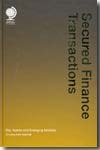Eco-Finance
the legal design and regulation of market-based environmental instruments
- ISBN: 9789041123107
- Editorial: Kluwer Law International
- Fecha de la edición: 2004
- Lugar de la edición: The Hague. None
- Colección: International Environmental Law & Policy Series
- Encuadernación: Cartoné
- Medidas: 24 cm
- Nº Pág.: 197
- Idiomas: Inglés

Market-based environmental instruments are the most creative of the many initiatives devised to combat air and water pollution and promote biodiversity. Among these, none has attracted more attention than the burgeoning trade in environmental allowances and credits. Originally developed in the United States around 1990, these varieties of tradable instruments were globally validated by the Kyoto Protocol of 1997, which explicitly contemplates the buying and selling of environmental allowances and credits among both sovereign states and corporate entities. Despite U.S. opposition to the Kyoto Protocol, global trading in pollution instruments is growing at an exponential rate, with instruments representing over 70 million tonnes of greenhouse gas emissions estimated to have been traded in 2003. Eco-Finance is the first in-depth legal analysis of this extraordinary hybrid of environmental regulation and global financial markets. It deals with what are currently the two dominant types of market-based environmental instruments: market-traded environmental instruments (which include the tradable pollution allowances envisaged by the Kyoto Protocol), and environmental financing instruments (which include the emerging class of environmental and socially responsible investment funds). Among the numerous topics and issues treated by Ali and Yano are the following: the cap-and-trade regime; debt-for-environment swaps; forestry securitisations; greenhouse gas emissions markets; carbon funds and swaps; tradable green certificates weather derivatives; duty to hedge climatic risks; catastrophe bonds; protected cell companies; the prudent investor rule; and ethical security indices. The authors deal searchingly with the critical legal issues that arise in connection with these market-based environmental instruments, such as the danger that courts might recharacterise underlying risk transfer agreements as illegal insurance products. For this reason, and for its wealth of practical,








